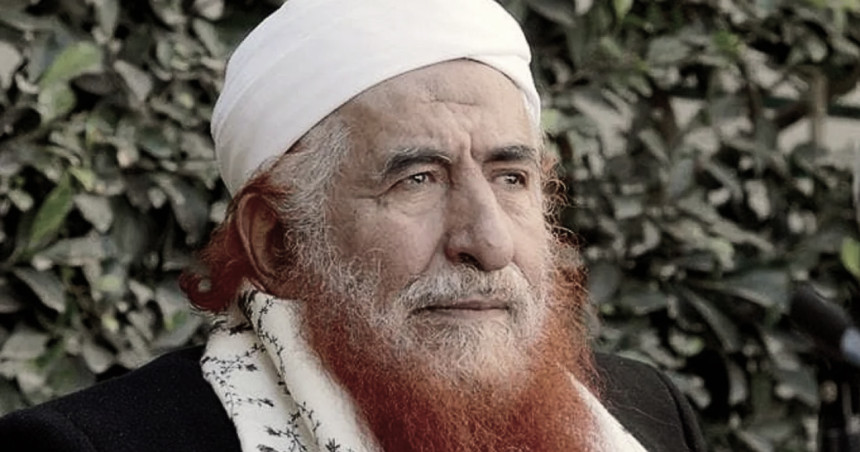Innā lillāhi wa innā ilayhī rājiʿūn. Indeed, to Allah we belong, and to Him we are returning.
It is with great sorrow that we share the news of the passing of Shaykh Abdul Majeed ibn Aziz al-Zindani, one of the most distinguished Yemeni scholars of his time. A founder of the International Union of Muslim Scholars and the founder of the Commission on Scientific Signs in the Qur’ān and Sunnah, Shaykh al-Zindani was 82 years of age. [1]
The late academic and political leader is remembered for his life spent studying and teaching, defending the rights of his fellow people, and playing a major role in efforts to improve Yemeni society, in resolving various issues and challenges.
In a 22 April statement released by the Yemeni Congregation for Reform — often referred to as al-Islah — the Supreme Authority of the political organisation said,
“With hearts that believe in Allah’s will and destiny, and anguished souls gripped by pain, the Yemeni Islah Party mourns — with its members, supporters, and masses, and the entire Yemeni people and the Arab and Islamic nation — the death of the venerable Shaykh Abdul Majeed ibn Aziz al-Zindani, member of the Supreme Commission for Reform, former Head of the Shura Council, and member of the Presidency of the Republic of Yemen during the period that followed.” [2]
The organisation continued in its remarks,
“With the passing of Shaykh Abdul Majeed al-Zindani, Yemen has lost a political, educational, and social figure and a great national leader whom the Yemeni people knew to be by their side, carrying their issues and defending their gains and rights.
“In spreading education and building the infrastructure for this sector, which was seen as a major gateway to solving the problems that Yemeni society suffers from, Shaykh Abdul Majeed al-Zindani — may Allah have mercy upon him — did not stop at one area, as he contributed effectively in the field of advocacy and guidance…
“He paid great attention to issues and problems, including conflicts and revenge issues from which Yemeni society was suffering, and did everything in his power to solve them, reconcile relations, and stop the bleeding of Yemeni blood as a result of tribal rebellions and wars. He succeeded in resolving many of them in most of the governorates.” [2]
Major gateway to solving societal issues
Born on 1 January 1942, the shaykh spent some of his youth in Egypt, going on to study chemistry and biology, before looking closely at Islamic sciences.
He also held an official position in Saudi Arabia, in the 1960s, before returning to Yemen to focus on positive societal and political change.
In 1990, Shaykh al-Zindani was a co-founder of al-Islah, along with Shaykh Abdullah ibn Husayn al-Ahmar, and Ali Mohsen al-Ahmar. And in 1993-5, he established al-Īmān University, where he held the position of President.
Shaykh Muhammad ibn Abdul Majeed al-Zindani, who holds the office of Professor of Comparative Jurisprudence at al-Īmān, is a son of the late scholar.
He had endured challenges in recent years
When the Yemeni civil war erupted in 2014, the academic’s house was one of the first to be targeted by Houthi rebels.
Indeed, during the storming of the capital Sana’a, his home and the buildings belonging to al-Īmān University were raided.
None of these events prevented, let alone reduced, his determination to continue his vital work in improving the lives of Yemenis, in addition to advocacy regarding Palestine — a cause which he was strongly passionate about.
Prior to his passing, Shaykh al-Zindani had been battling illness, whilst receiving hospital treatment in Turkey.
Condolences pour in from around the world
in addition to the two organisations he was closest to, i.e. the International Union of Muslim Scholars and al-Islah, the Palestinian Scholars Association, the Association of Muslim Scholars in Iraq, and Shaykh Dr. Ali Muhammad al-Sallabi — a prominent Libyan Islamic historian and scholar — also expressed his condolences. [3]
Analysis
ANALYSIS
A leader of unique standing
Shaykh al-Zindani was a very unique person, in addition to a unique example for those who aspire to pursue knowledge.
I had the pleasure to attend some of his lectures and to meet with him personally, when he was working in King Abdulaziz University in Jeddah.
At times, he was specialised in scientific miracles documented in the Qur'ān, and he was well-known for this work.
Later, when the situation began to change in Yemen, Shaykh al-Zindani started to be politically active. And he established al-Īmān University, began to give tarbiya to the people, and participated in building the country and its political environment.
Likewise, when the Houthis began to take over the country, he was active in responding to them.
An example to all scholars
Despite his advanced age, he never stopped working for his country, according to what was needed.
And this is a very important lesson: that the scholar should not simply stick to one field or one direction that he happens to like.
Rather, he should continually adapt to the needs of the Muslim Ummah, just as Shaykh al-Zindani did.
May Allah (subḥānahu wa ta'āla) have mercy upon him and grant him Jannat al-Firdaws.
Source: Islam21c
Notes










